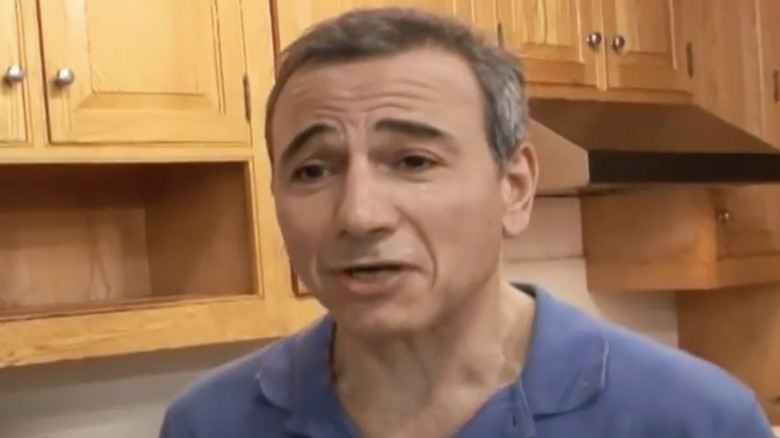12 Food Competition Shows That Flopped
It's relatively easy and cheap for TV producers to throw some people up on the screen and have them prepare a meal, whether they're enthusiastic home cooks or trained and seasoned chefs. For that reason, cooking instructional shows have been a part of broadcasting for decades, filling out the schedules of public television and Food Network. Food-based TV kept up with the times then when reality TV proved explosively popular in the late 1990s. One sub-genre in particular resonated with audiences — competition shows, even cooking contests. Regular people and food experts could suddenly also be TV stars, participating in programs presented like sporting events (or talent shows like "American Idol," or high-stakes, elimination tournaments like "Survivor") that put their cooking skills and reputations to the test. Some of the most popular TV shows of any kind of the 21st century have featured highly pressurized food preparation battles, including "Hell's Kitchen," "MasterChef," "Top Chef," "Chopped," and various versions of "Iron Chef."
Most networks and many TV producers, in search of the next big food competition hits, have thrown a lot at the proverbial wall to see if their idea will stick. Sometimes they miss the mark. Here are some of the shortest-lived, most spectacularly failed cooking competition shows in TV history.
1. Food Network Star Kids (2016)
Starting in 2005, Food Network executives theorized that they didn't necessarily have to scout on-air talent from the worlds of cookbooks and restaurants — they could cultivate their own hosts. And so "The Next Food Network Star," later called "Food Network Star" was born. Each season, people with presence and food knowledge and abilities would compete in a series of challenges and competitions, with the winner getting their own Food Network show. It's how Guy Fieri and Jeff Mauro made the leap to TV, and after 12 seasons of the series, Food Network created a sibling series that featured preternaturally talented child and tween cooks.
Wryly hosted by former child star Tia Mowry (of "Sister, Sister"), "Food Network Star Kids" subjected 10 minors to six weeks' worth of major challenges regarding cooking and media training. The winner: Amber Kelly, who wasn't exactly an unknown entity to Food Network viewers, having competed on a season of "Rachael vs. Guy: Kids Cook-Off" two years earlier. Unlike "Food Network Star" winners, Kelly didn't get her own show on Food Network. Nor did "Food Network Star Kids" get to take up any more airtime — all that ever aired was a six-episode first season.
2. Cooking on High (2018)
The TV landscape has witnessed numerous niche cooking shows, such as Food Network's many cake-based competition programs and Netflix's 2018 series "Cooking on High." The twist in that one: Every challenge offered to the kitchen-adept contestants, and every dish created during those challenges, had to use cannabis, aka marijuana, in some fashion. Creating food that promised a heavy buzz had come a long way since "pot brownies" — recreational and medicinal marijuana was increasingly legal throughout the U.S. by the time the pun-named "Cooking on High" went into production and showcased cooks and professional chefs who made complex entrees and desserts.
Hosted by self-proclaimed "cannabis expert" (via Twitter) Ngaio Bealum and YouTube personality Josh Leyva and judged by special celebrity guests, "Cooking on High" earned terrible reviews. The Washington Post called it "the worst food show on Netflix." A second season never transpired; Netflix never explicitly canceled "Cooking on High," but it never ordered more episodes of the show. It also essentially replaced "Cooking on High" with another marijuana cookery show, "Cooked with Cannabis," which similarly aired a single season in 2020.
3. The American Baking Competition (2013)
Shortly after its debut on British television in 2010, "The Great British Bake Off" became a cultural phenomenon. Arguably the most gentle, friendly, and low-stakes reality competition show in TV history, the series assembled accomplished hobbyist bakers from throughout the United Kingdom into a big white tent on a country estate where they'd vie to win the weekly "Star Baker" award via a "signature challenge," "technical challenge," and "showstopper challenge." Early seasons of "G.B.B.O." dominated the U.K. viewership charts, and it made an unlikely household name out of one of its judges — gruff, goateed master baker Paul Hollywood.
With popularity and personality seemingly built in, "The Great British Bake Off" was primed for export and translation in other countries, and in the summer of 2013, CBS debuted "The American Baking Competition." A U.S. remake of "G.B.B.O.," it kept a similar competition format, brought on Hollywood as a judge, and featured popular comedian Jeff Foxworthy as host (replacing British comedy duo Sue Perkins and Mel Giedroyc). Just seven episodes of this particular American iteration of the baking contest aired. Ratings were bad, and the show's fortunes weren't helped by a scandal — the married Hollywood was caught in an affair with co-judge Marcela Valladolid.
4. Rat in the Kitchen (2022)
The idea of an imposter or mole living and working amid a supposedly tight-knit group is a trope pulled straight out of mystery fiction and utilized in the mega-popular 2020s mobile game "Among Us." In 2022, TBS applied the concept to the cooking competition reality TV format with "Rat in the Kitchen." A collective of cooks took part in different challenges each week, along with the overarching concept of trying to figure out which person among their own was also actively sabotaging everyone else's efforts. The identity-concealing cooking show, hosted in tandem by celebrity chef Ludo Lefebvre and comedian Natasha Leggero, was marketed as a mixture of "The Masked Singer" and "Hell's Kitchen."
Produced by British TV companies for American broadcast, cable network TBS aired "Rat in the Kitchen" right around the time that parent company Warner Bros. merged with Discovery, Inc. That brought TBS and some food-oriented outlets under the same corporate umbrella, which made a cooking show on a general cable channel unseemly to executives. "We decided not to do more 'Rat in the Kitchen,'" chief content officer of Warner Bros. Discovery's U.S. Networks Group Kathleen Finch said at a Realscreen event (via Deadline). "We now have Food Network and Cooking Channel in the family, so it doesn't really make sense to spread the peanut butter so thin from a content perspective."
5. Bobby's Dinner Battle (2013)
Going by endurance and the sheer volume of programming, Bobby Flay is the most dominant personality in Food Network history. The chef and restaurateur debuted on the channel in its infancy in 1996 with "Grillin' and Chillin,'" one of the many shows he'd eventually host on Food Network. Many were long-lasting hits, like "Beat Bobby Flay" and "Throwdown With Bobby Flay." Others were decidedly not that popular, particularly "Bobby's Dinner Battle." Flay and his team hit Chicago, Los Angeles, New Jersey, New York, and Dallas in search of the United States' best home cooks and arranged them into teams to each represent their cities. Then they all competed to make three-course dinner parties with a small budget and other specific parameters.
Only five episodes of "Bobby's Dinner Battle" aired on Food Network in 2013. According to an interview at the 2013 South Beach Wine and Food Festival (via Food Network Gossip), Flay said the show wasn't renewed for Season 2. The reason, the chef said: "It just didn't work."
6. American versions of Come Dine with Me (2006 and 2013)
Like a cross between a very fleeting "Big Brother" or "The Real World" type situation and "Top Chef" with regular, untrained home cooks, "Come Dine with Me" hit the airwaves in the U.K. in 2005, and it became a long-running TV institution. The setup: Four strangers who all live in the same town go over to each other's homes where the host cooks an appetizer, entrée, and dessert to the best of their abilities. Some awkward conversation and attempts to entertain one another ensue, everybody rates the dinner on a 1-10 scale, and a brutally sarcastic narrator provides comical commentary throughout. At the end of the week, the winner receives a nominal cash prize.
With such a simple, entertaining, and endlessly repeatable format, "Come Dine with Me" has been adapted all over the world, with hit versions airing in countries including Australia, Canada, and Ireland — but not the U.S. In 2006, TLC broadcast just six episodes of the Americanized "Dinner Takes All." Seven years later, Lifetime gave the idea another shot, but "Come Dine With Me U.S." made it just four episodes that second time around.
7. Family Food Fight (2019)
Like "Family Feud" but with food, "Family Food Fight" aired on Australia's Nine Network for two seasons in 2017 and 2018. The concept was simple, dramatic, and fast-paced, featuring teams consisting of three relatives, each competing to make the best dish each episode. In June 2018, ABC acquired the rights to remake "Family Food Fight" for American television and ordered an eight-episode first season. Producers signed cookbook author and TV food personality Ayesha Curry to host and later convinced veteran chefs and television stalwarts Graham Elliot and Cat Cora to be the judges.
But despite the well-tested format, star power, and the involvement of legitimate culinary icons, the American version of "Family Food Fight" flopped in the U.S., earning middling ratings. ABC aired the series as part of its summer programming slate in 2019, and Chicago-based sisters-in-law Azeema, Fatima, and Kiran beat seven other family teams to become the only winners of the only season of "Family Food Fight."
8. Kitchen Casino (2014)
Debuting in 2014 into a television landscape overcrowded with cooking competition shows, Food Network's "Kitchen Casino" at least had a novel premise to differentiate itself from its many competitors. Hosted by businessman Bill Rancic, who won the first season of reality show hit "The Apprentice," "Kitchen Casino" pitted four chefs against each other in a contest to prepare fancy food items. Guest judges would then decide which was the best.
The whole thing had a casino theme that played out in every possible way, even if it seemed a little shoehorned — ingredients and sensibilities to use in dishes were revealed via video slot machine, cooking stations were placed on novelty roulette wheels, and a poker-like deal of a deck of food-themed cards determined how contestants would prepare their final entry.
Eight episodes of "Kitchen Casino" aired on Food Network's primetime schedule in the spring of 2014, and then no more. Ratings for the series were woefully low, with only about 850,000 people tuning in to the most-watched episode, the series premiere. After its run completed, Food Network not only didn't order a Season 2 but opted to air reruns of "Cutthroat Kitchen" instead of encore plays of "Kitchen Casino."
9. Chefs vs. City
Part travel show, part cooking battle, and part "The Amazing Race," "Chefs vs. City" featured established chefs and TV stars Aarón Sánchez and Chris Cosentino. Each episode, they'd go to a different major American food city, find a couple of prominent local chefs, and compete against them in a cook-off — Sánchez and Cosentino on one team, the guests on another. Contestants would receive a sack of tools, a dossier, and an SUV, which they'd use to move about and complete different parts of a challenge in a timely fashion.
"Chefs vs. City" aired two seasons in rapid succession in 2009 and 2010 before the series was canceled. Four years later, at the 2014 MAD 4 Symposium, Cosentino explained that the end of the show was a relief — he'd hated the show's tough schedules, and he thought that some participants had been humiliated on television, among other grievances.
10. Beat the Chefs (2012)
What are cooking shows but gussied-up game shows? To that end, Game Show Network got in on the craze in 2012 with "Beat the Chefs." Hosted by country singer and former reality show contestant Matthew Rogers (a low runner-up on "American Idol" in 2004), each episode offered the intriguing premise of two teams cooking the same classic, familiar meal — except one team was a real family using their recipe, and the other was a bunch of top chefs (Jeff Henderson, Antonia Lofaso, and Beau MacMillan) making a high-end restaurant version of the dish. Ultimately, the family of amateur cooks won something no matter which entry the judges (two regulars and a guest) deemed superior. If the relatives emerged victorious, they got $25,000. If the chefs won, the family got $1,000 in kitchen gear.
After its first few episodes aired in September 2012, Game Show Network took "Beat the Chefs" off the air, ran the remainder of the banked episodes later that year, and never did order another season.
11. The Final Table (2018)
"The Final Table" was certainly an ambitious competition series. On the other hand, it was extraordinarily complicated. At the outset of the 2018 competition, 12 two-person chef teams from 12 countries were introduced. Each episode, they were challenged to cook a dish in the style of one of the teams' home nations. In the first round, the entries were judged by a panel consisting of a food critic and celebrities from the country in question. All but the three lowest-scoring teams moved on to the next episode, while the bottom finishers competed again in "The Final Plate Challenge," cooking a different traditional dish but with a specific ingredient chosen by a guest celebrity chef. The lowest-scoring team from that round was eliminated, with each installment of "The Final Table" whittling down the remaining teams until a winner was declared.
Netflix canceled "The Final Table" after Season 1 by default, as it never renewed the game show.
12. Recipe for Deception (2016)
In January 2016, the programming slate of Bravo, home already to "Top Chef" and its many themed and one-off spinoff shows, welcomed a new and playfully cutthroat cooking competition in the form of "Recipe for Deception." Hosted by comedian and actor Max Silvestri, each episode involved the participation of four chefs, who, in head-to-head battles, cooked entrées based off an ingredient of the week, be it bacon, lentils, pickles, or chicharrones, for example. The big twist: That secret, important ingredient remained a mystery until after they were done cooking. To get their dishes in order, the contestants asked their rivals yes-or-no questions, a variant of "Two Truths and a Lie" in which they all could strategically fib, going on whatever knowledge they'd manage to obtain or figure out, to protect themselves and sabotage the others.
"Recipe for Deception" earned very low viewership figures in its brief first season. That justified Bravo's decision to let the show die after airing just 10 episodes.












